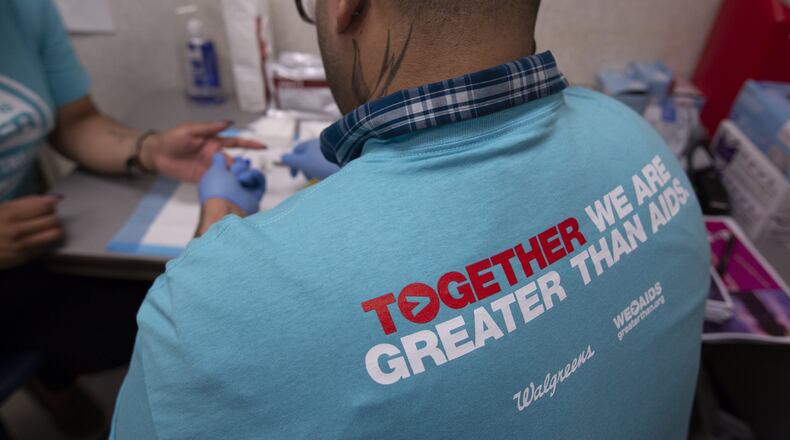Nearly 2,700 people received an HIV diagnosis statewide in 2017 — the highest rate in the U.S., with 69% of Georgians infected with HIV residing in Atlanta, according to the Georgia Public Health Department.
No surprise there. We’ve known for quite some time that when it comes to HIV infection, Atlanta is literally a hotbed, but here’s a bit of good news: If you don’t know your status, now’s a good time to find out.
In perhaps the largest in-store event ever, Walgreens and Greater Than AIDS are offering free HIV testing Thursday, June 27, at pharmacies here and across the country.
The effort is part of National HIV Testing Day and an ongoing commitment to extend the reach of HIV testing and information to communities. Getting an HIV test is the first step to identifying people with the HIV infection, and the pivotal entry point into the medical care system for both treatment and prevention.
“The CDC recommends adults get tested annually for HIV as part of their health care routine and yet approximately 1 in 7 people living with HIV in the U.S. do not know they have the virus,” said Xavier Brager, a Walgreens pharmacist based in Atlanta. “Knowing one’s HIV status can be the first step in understanding options for HIV prevention medications, should an individual test negative.”
To date, Walgreens has provided more than 45,000 tests since launching the annual event in 2011. The pharmacy hopes to significantly increase that number through its efforts this year, Brager said.
RELATED: The Silent Epidemic: Counting the cost of being ignored
Starting at 10 a.m. and ending at 7 p.m., local time, Walgreens and Greater Than AIDS will combine efforts with health departments, HIV/AIDS service organizations, and other community organizations to provide testing and information at select Walgreens stores in more than 260 cities.
Dr. David Malebranche, associate professor at the Morehouse School of Medicine, said everyone who is sexually active should be HIV tested, and it should be as routine as getting a checkup or your blood pressure and cholesterol checked.
He noted June also happens to be Men’s Health Month.
Why is that significant?
Men usually account for about 70%-80% of new HIV cases annually, and men who have sex with men make up the majority of these cases, Malebranche said.
But heterosexual men shouldn’t ignore their status either.
While heterosexual men accounted for only 7% of the new HIV cases in the United States in 2017, Malebranche said risks for being exposed to HIV are not always about “who you are,” but more about what behaviors you engage in, where you live and with whom you have sex.
“The broader picture is this,” he said. “Getting an HIV test at least yearly if you are sexually active should be a part of your routine health checkup just as much as checking your cholesterol or kidney function is.”
Credit: The Atlanta Journal-Constitution
Credit: The Atlanta Journal-Constitution
In addition to offering on-site free and fast HIV testing, counselors from local agencies will answer questions about HIV prevention and treatment options, including PrEP. No appointment is required.
For years now, the use of antiretroviral medications to prevent HIV transmission, known as PrEP, a daily pill that protects against HIV, has promised new pathways to ending HIV. Based on the strength of the scientific advances, the White House and many states have set ambitious goals to significantly reduce HIV infections over the next decade.
Tina Hoff, a senior vice president and spokeswoman at the Kaiser Family Foundation, said in a press release that “Public-private partnerships like this help to close the knowledge gaps about HIV and connect people with services in their communities to get the care they need.”
According to a recent national survey by KFF, which runs Greater Than AIDS, fewer than half of Americans know about PrEP, and many understate the health and preventative benefits of HIV treatment.
Brager, a Walgreens pharmacist for more than eight years, said the pharmacy is one of the first to offer specially trained HIV personnel and has been supporting the fight against HIV since the beginning of the epidemic.
RELATED: Why Atlanta is still struggling with rising new HIV diagnoses
“National HIV Testing Day is part of our ongoing commitment to combat HIV/AIDS and support affected patients and their families. We know that many people are still unaware of their status and only about half of the persons who are HIV positive are virally suppressed,” he said. “The risk of HIV transmission from a person living with HIV who is on antiretroviral therapy and has achieved an undetectable viral load in their blood for at least six months is negligible to nonexistent. Getting tested is the first step everyone can do to help contribute to efforts underway to end HIV/AIDS.
“My team and I are ready to provide the one-on-one, confidential advice needed to help support best possible outcomes, and can assist with other care needs such as identifying copay assistance programs,” he said.
“If people are not able to make it to Walgreens’ free testing day, there is continued access to testing at HIV/AIDS service organizations, departments of health, and community providers that offer free or low-cost testing.”
For a complete list of participating Walgreens locations, supporting partners for this year's National HIV Testing Day, and additional information about HIV testing, including year-round testing sites, visit greaterthan.org/walgreens.
Find Gracie on Facebook (www.facebook.com/graciestaplesajc/) and Twitter (@GStaples_AJC) or email her at gstaples@ajc.com.
About the Author
Keep Reading
The Latest
Featured





